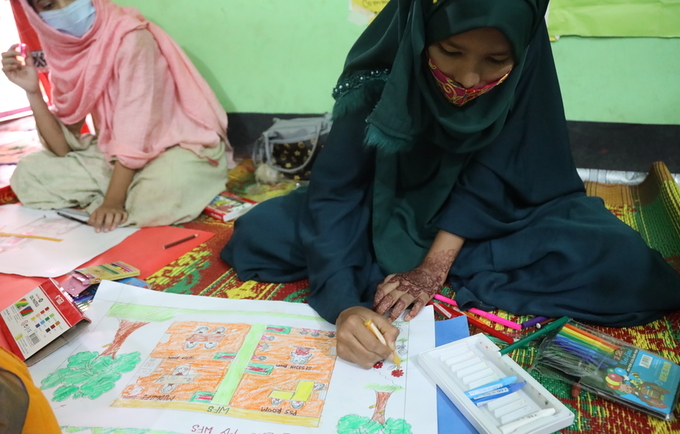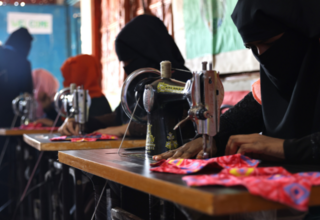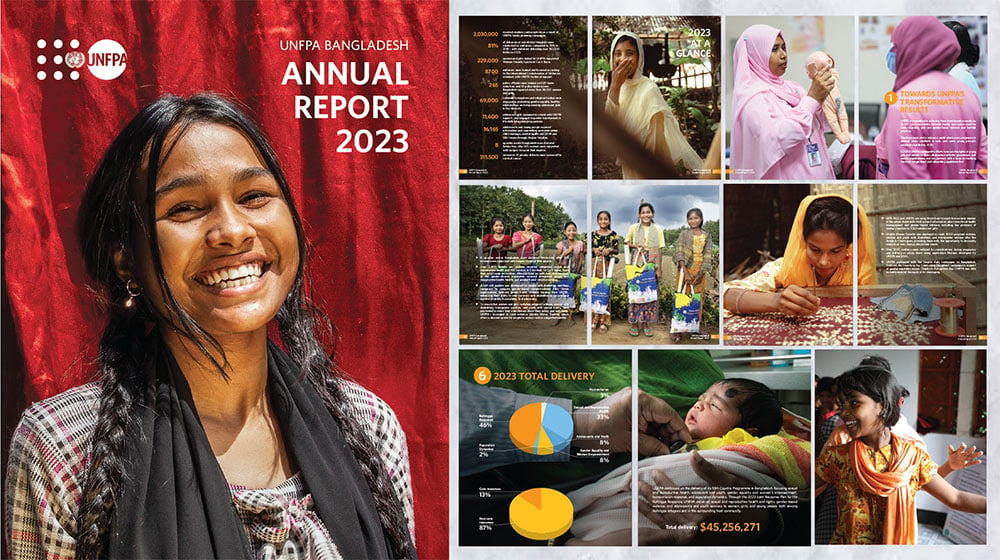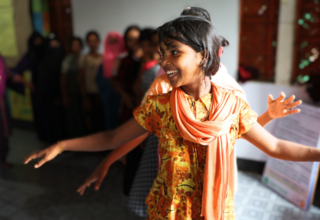Each year between 25 November (International Day for the Elimination of Violence Against Women) and 10 December (Human Rights Day), the world comes together to demand a safer world for women and girls by marking 16 Days of Activism Against Gender-Based Violence. In Cox’s Bazar, Bangladesh, where UNFPA is responding to the protracted Rohingya refugee crisis for the fifth year, a series of events and trainings took place this year to advocate for the safety and dignity of women and girls in the refugee camps and surrounding host communities. Below, you may learn about the highlights of our 16-day journey!
Humanitarian workers commit to #EndGBVTogether on International Day for the Elimination of Violence Against Women
The 16 Days of Activism celebrations in Cox’s Bazar were kicked off on the International Day for the Elimination of Violence Against Women, with an event hosted by the Ministry of Women and Children Affairs, the UNFPA-led GBV Sub-sector and the Gender in Humanitarian Action Working Group. The event brought together representatives of the Ministry of Women and Children Affairs, ISCG, UN Agencies and various NGOs to discuss collective actions to end gender-based violence in the refugee camps. In addition, a viral video with gender workers and advocates in Cox’s Bazar stating their personal commitments to end gender-based violence was shown at the event for the first time. Please watch the video here!
The head of UNFPA Sub-Office in Cox’s Bazar, Roselidah Raphael, participated in the opening ceremony on International Day for the Elimination of Violence Against Women. ©UNFPA Bangladesh
End AIDS, end inequalities, end pandemic. NOW.
On December 1, UNFPA marked World AIDS Day alongside World Health Organization by hosting an awareness-raising session for Rohingya women, where they learned about the medical services available to survivors of gender-based violence in the camps. The participants received information on ways to access health facilities in the camps as well as timelines and procedures that should be followed to receive treatment in cases of sexual violence.
UNFPA and WHO work in close collaboration with their partners in the refugee camps to ensure that unwanted pregnancies and sexually transmitted infections do not spread in the Rohingya community as a result of sexual violence.
“Receiving timely medical attention in case of gender-based violence is essential, as sexual violence can lead to life-threatening infections,” Ms. Khadija Tul Kobra, UNFPA GBV case management officer stated in her remarks to the women participating in the training.
Preventing the spread of AIDS and HIV in the camps is key priority of both UNFPA and WHO in the Rohingya camps. ©UNFPA Bangladesh
Advocating for the rights of persons with disabilities on International Day of Persons with Disabilities
To mark International Day of Persons with Disabilities on December 3, UNFPA, Mukti and Gana Unnayan Kendra organized a range of events to raise awareness of the rights and challenges of people with disabilities. Recreational activities and awareness raising sessions were held in each of the 29 Women Friendly Spaces and 10 Women-Led Community Centres in both the refugee camps and host communities.
People with disabilities engaging in a ball throwing competition in one of the Women-Led Community Centers. ©UNFPA Bangladesh
22-year old Samsida was one of the many persons with disabilities who participated in the activities. “I am so happy to be here, it feels like Eid to me. I liked all the activities, but my favorite thing was the henna making and the session in which we learned about ways to maintain hygiene in our everyday lives,” Samsida shared at the end of the day.
As a result of her disability, Samsida has difficult walking and she cannot often go to places and complete everyday tasks by herself. Coming to the Women Friendly Space gives Samsida comfort amidst the daily challenges she faces: “Due to my disability, I am often neglected by my community and my neighbors make fun of me. When I come to the Women Friendly Space and speak with the staff and other women from my community, I feel better about myself,” she explains.
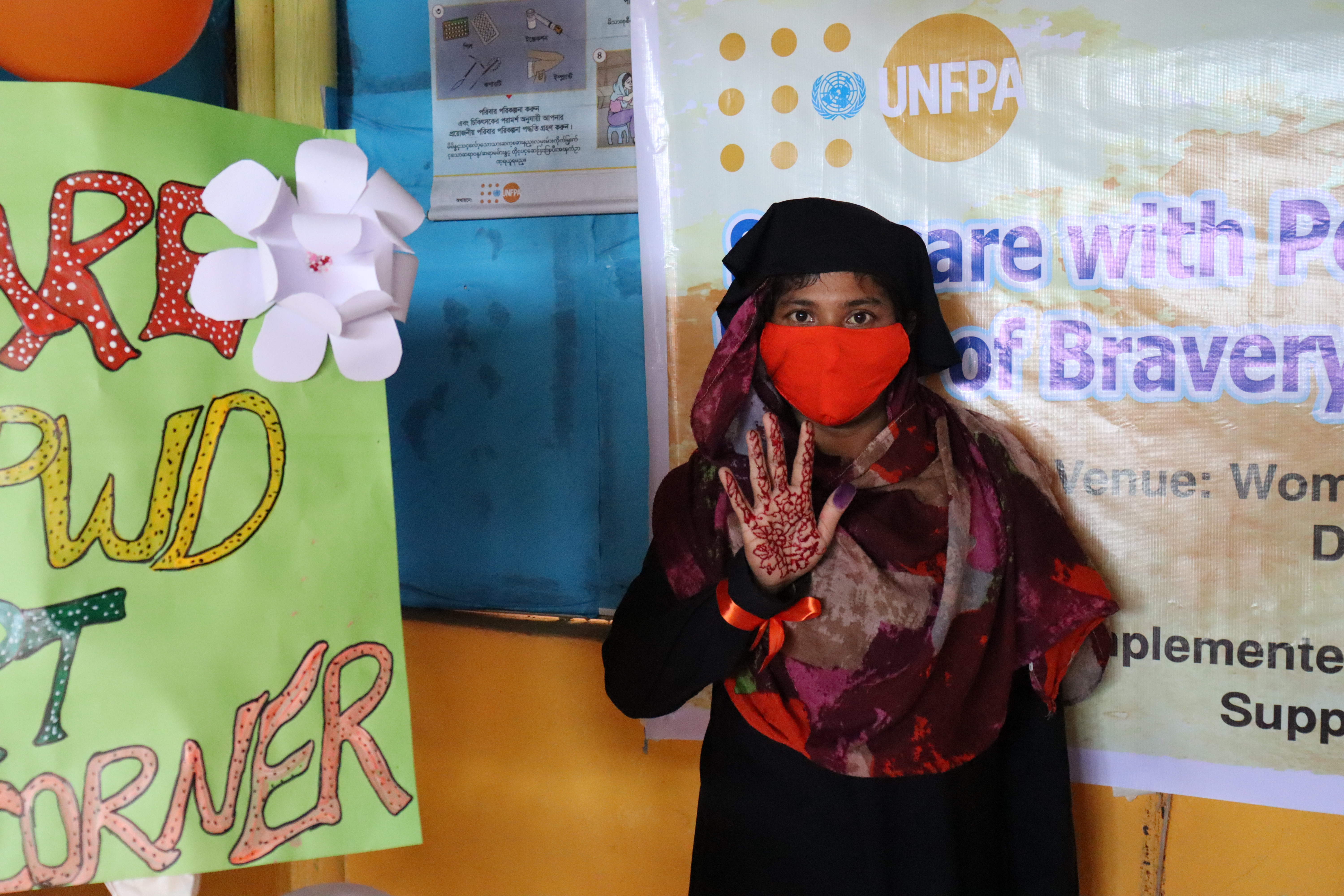
For 22-year old Samsida, coming to the Women Friendly Space is a way to escape the discrimination she faces in her daily life due to her disability. ©UNFPA Bangladesh
Block Batik competition for Women’s Empowerment
In collaboration with its implementing partner Gana Unnayan Kendra (GUK), UNFPA also organized a block batik competition for women and adolescent girls at a Women-Led Community Center in one of the host communities. Many women and girls took part in the event, painting tablecloths, pillowcases and stitching flowers onto masks.
“At the Women-Led Community Center, we have learned a variety of skills that have helped us to earn money,” said Fulmoti, one of the participants. “When a woman is able to contribute to her family, she has more freedom in making decisions. I believe that women's empowerment will mitigate gender-based violence against women.”
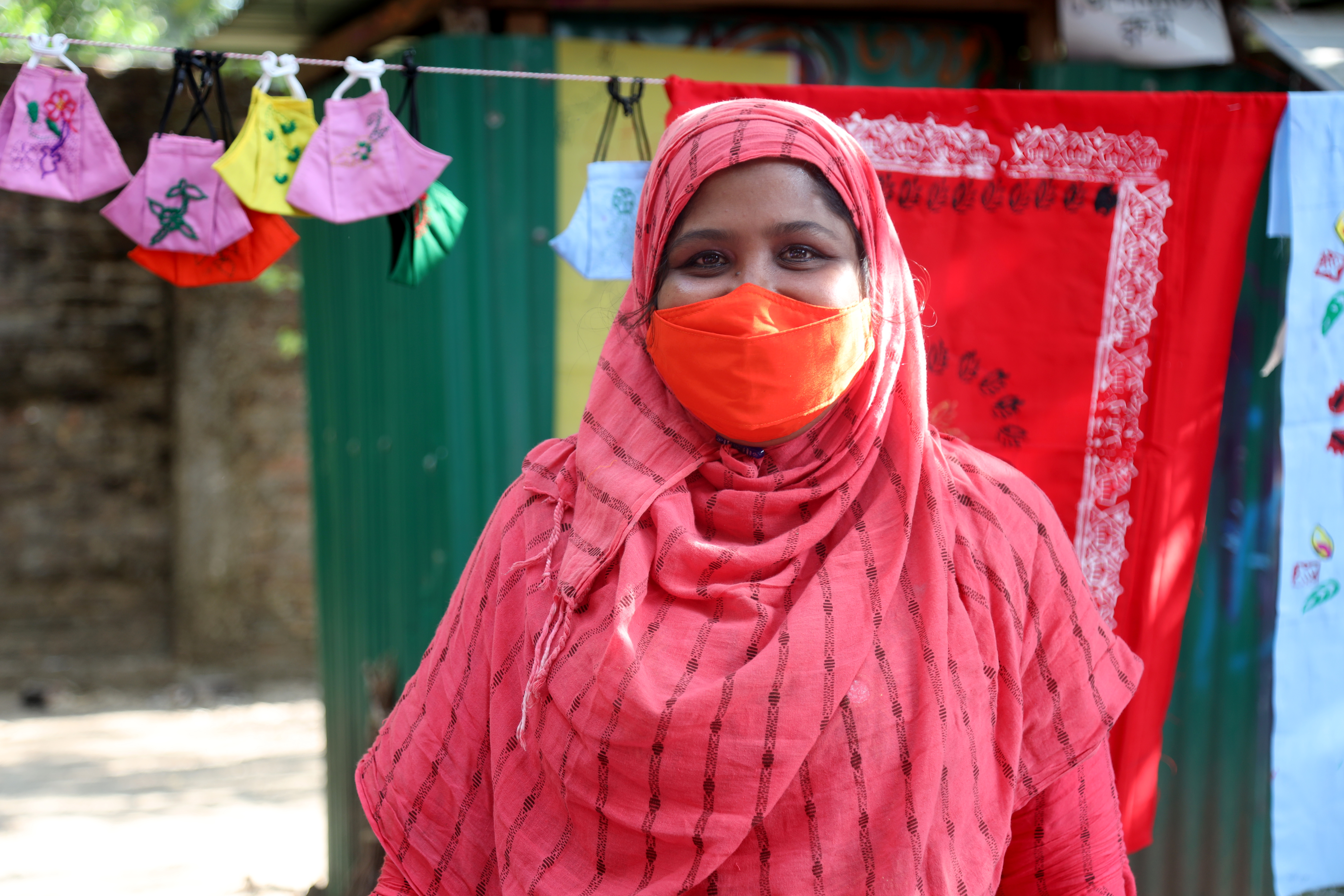
For Fulmoti, the key to gender equality is teaching women skills that enable them to become more self-reliant. ©UNFPA Bangladesh
Ensuring Rohingya women’s access to family planning in the refugee camps
In addition to the above-mentioned activities, family planning campaigns were held in various parts of the camps by UNFPA and its implementing partner IPAS. Paramedics and doctors were mobilized to provide family planning counseling and information to women in the camps. Many women attended the awareness raising sessions and received short-term and long-term family planning methods for themselves.
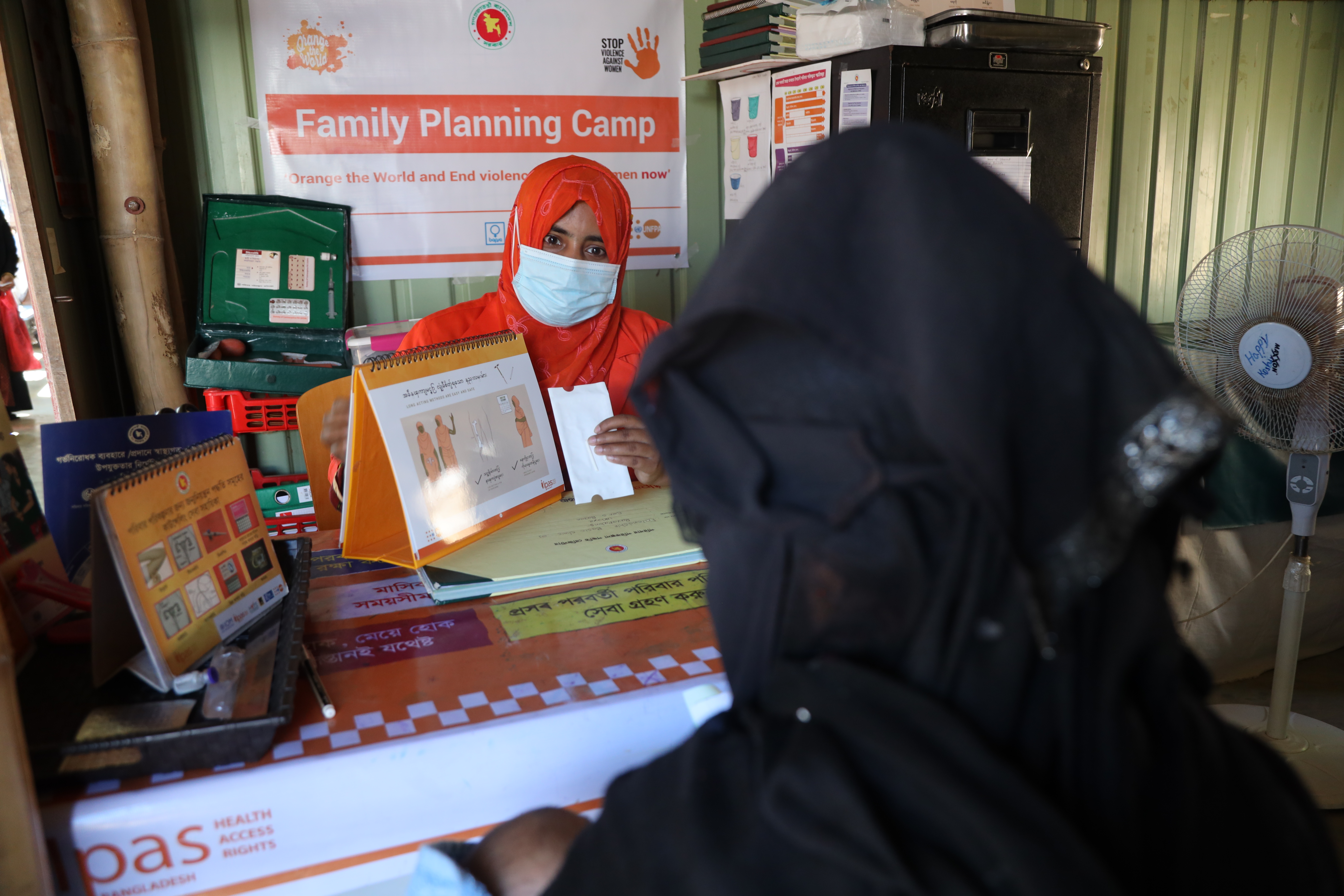
By ensuring access to family planning, UNFPA wants to ensure the bodily autonomy of women in the refugee camps and surrounding host communities. ©UNFPA Bangladesh
Jahan, a mother of two, came to the one of the campaign sites with her mother-in-law. “Because I already have two children, my mother-in-law recommended me to find a long-term family planning solution for myself. I am currently thinking about using a method that would prevent me from getting pregnant for the next 5 years,” Jahan explains.
As a mother of eight children herself, Jahan’s mother-in-law Nur Aysha is happy about the availability of family planning for the younger generations: “From personal experience, I know that having too many children can have a negative impact on someone's life. This is why I advised my daughter-in-law to not have more children for now. I consider her my daughter, and I want her to live a happy and healthy life.”
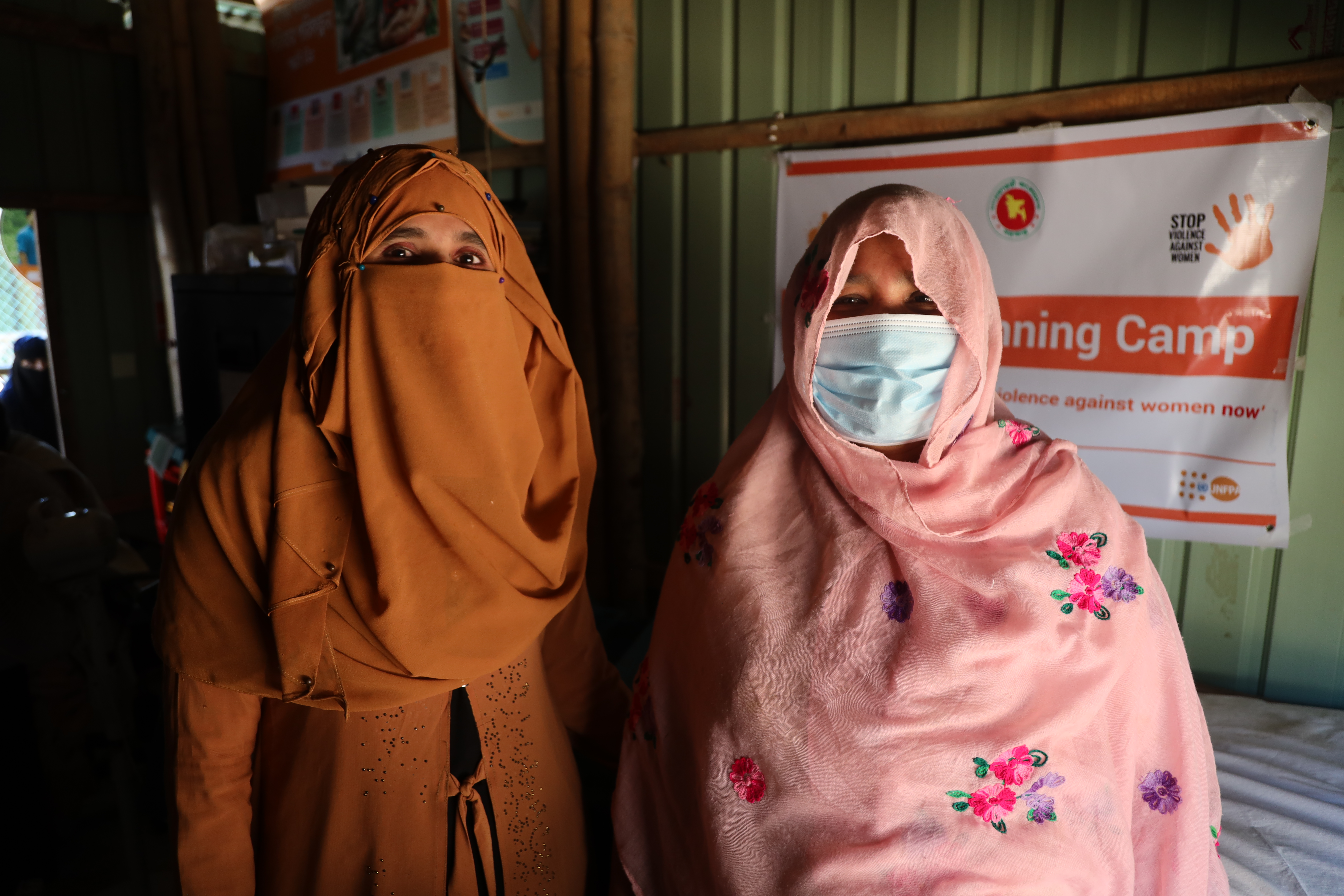
Jahan (left) decided to explore long-term family planning options after her mother-in-law Nur Aysha (right) advised her to do so. ©UNFPA Bangladesh
Mobilizing transgender people to rally for their rights
In collaboration with Bandhu Social Welfare Society and Mukti Cox’s Bazar, UNFPA also organized an awareness raising session on gender-based violence for more than twenty members of the transgender community from the Kutupalong, Ukhiya refugee camps. Bandhu Social Welfare Society has established a wellness center for transgender people in the camps. The center provides the transgender community a safe space, where they can engage in recreational activies, receive psychosocial support learn and receive free HIV and STI testing.
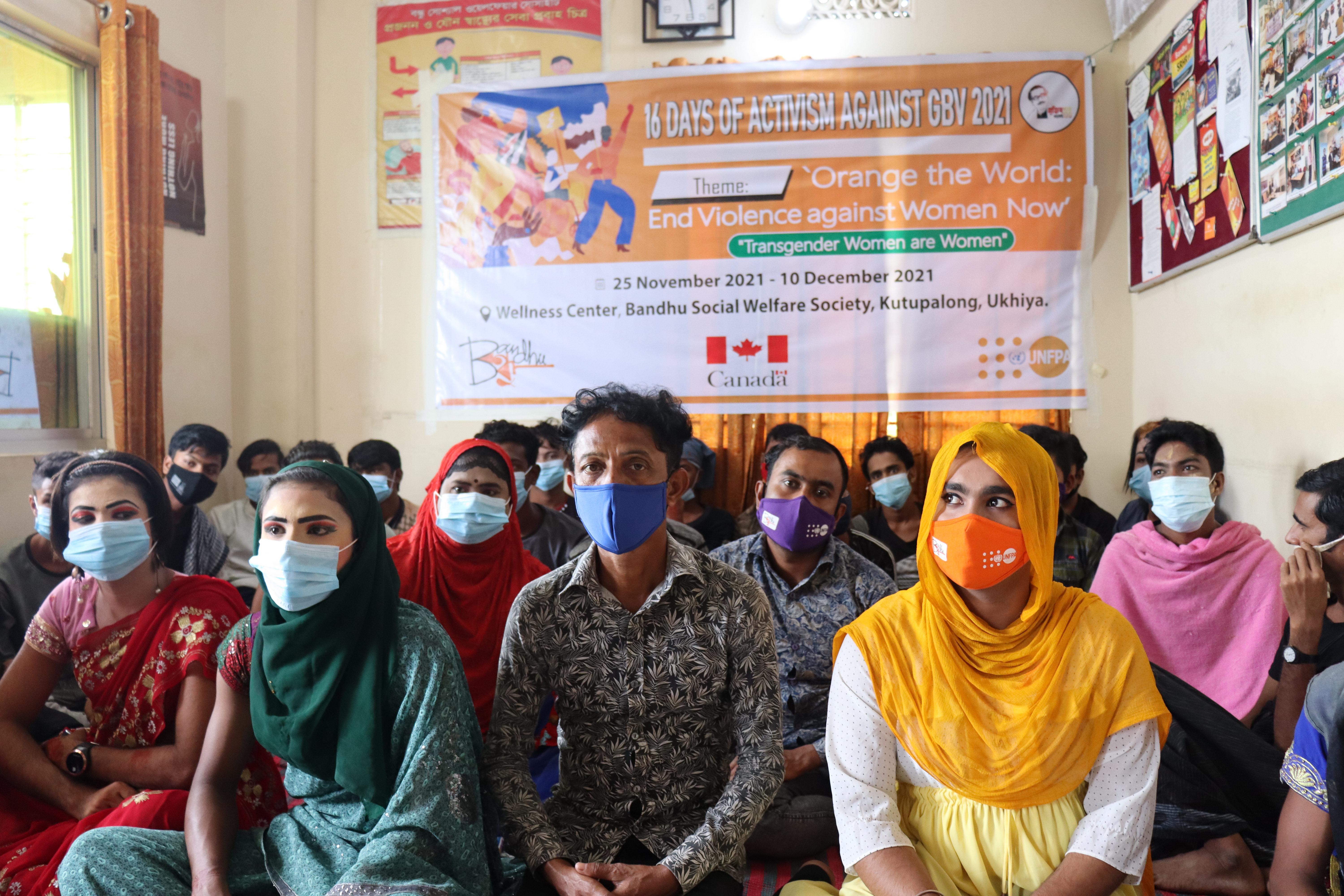
As a result of persistent social stigma and superstitions, transgender people in Bangladesh face an exceptionally high risk of gender-based violence. ©UNFPA Bangladesh
“Outside of the we, we are not always safe. People stare at us, throw rocks, and they do not allow us to wear female clothing or keep our hair long. Massive awareness campaigns on gender sensitivity should take place more often so that society knows that we exist and that we have the same rights and freedoms as men and women,'' explain Shundori, 22 and Shewly, 45, two transgender women from the campscamps.
“As a transgender woman, I feel like a woman. I have a husband and I just wish to lead a normal life like the rest of women and men do in the society. I do not want others to always look at me, just because I do not abide by the “ man” or “woman” classification,” Shundori , continues.
“My dream for the future is to work for the well-being of transgender people. The Gender-diverse population needs additional mental support, access to sexual and reproductive health and rights services, as well as more livelihood opportunities,” added Muscan, a 20-year old transgender woman from the camps.
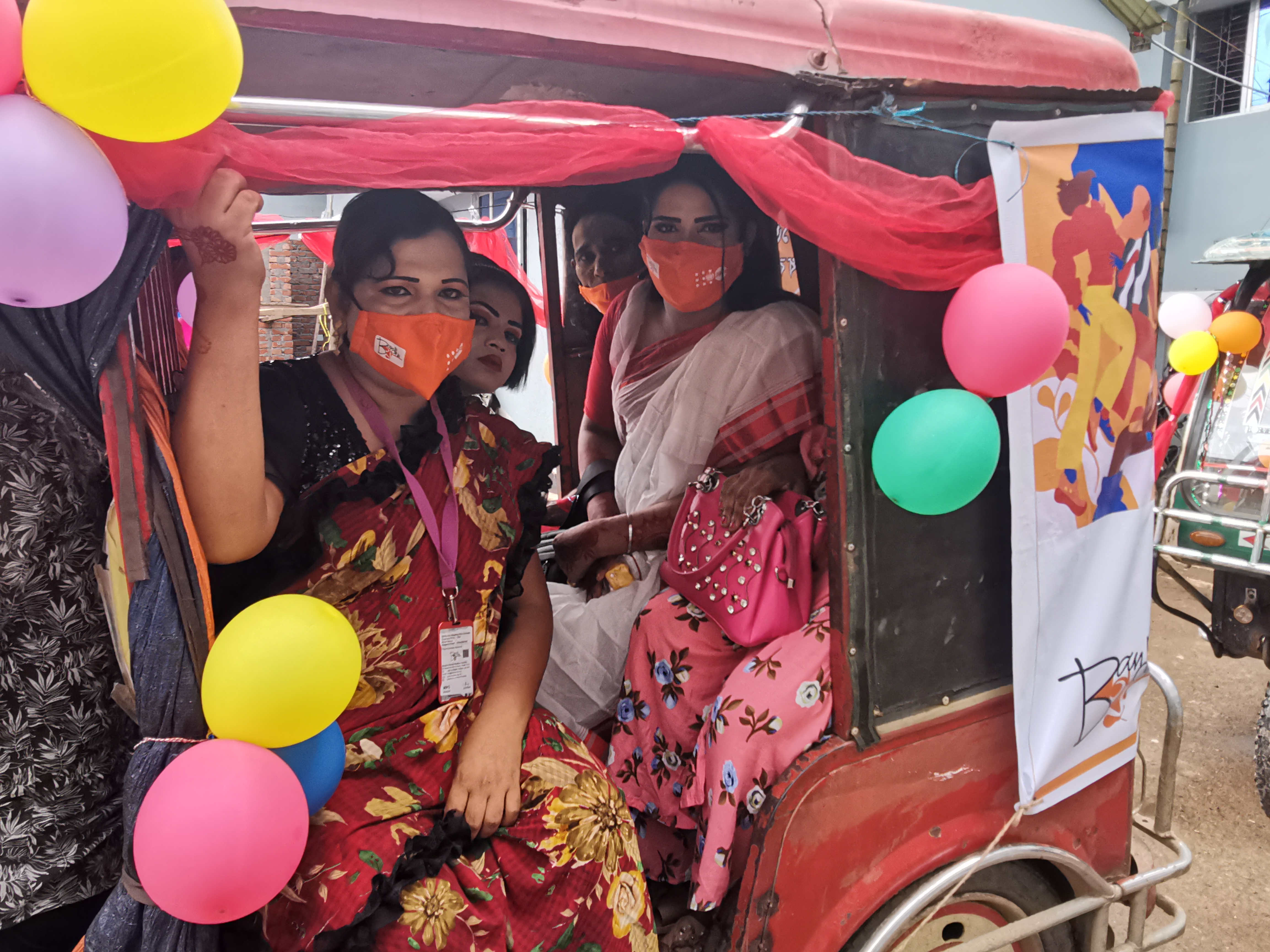
The transgender people attending the event decorated a CNG to raise awareness of the challenges they face. ©UNFPA Bangladesh
Celebrating the women of Cox’s Bazar on Begum Rokeya Day
On December 9, UNFPA’s implementing partner CARE hosted a Mega Women Leaders’ gathering to celebrate women’s achievements and women’s stories in Cox’s Bazar. The event was held in the framework of the “Strengthening Sexual and Reproductive Health and Rights and Gender-based Violence Prevention services in Cox’s Bazar” project funded by the Government of Canada. The event coincided with Begum Rokeya Day when all of Bangladesh celebrates the life of the feminist thinker, educator and political activist, who is widely considered a pioneer of women’s liberation in South Asia.
Both UNFPA and the Directorate General for Family Planning were present at the even to deliver speeches and highlight women’ s vital contributions to Bangladeshi society. In addition, eighteen women leaders were awarded with crests in recognition of their achievements in managing cases of gender-based violence, hosting courtyard activities, operating Women-Led Community Centers and organizing self-reliance groups for women in Cox’s Bazar.
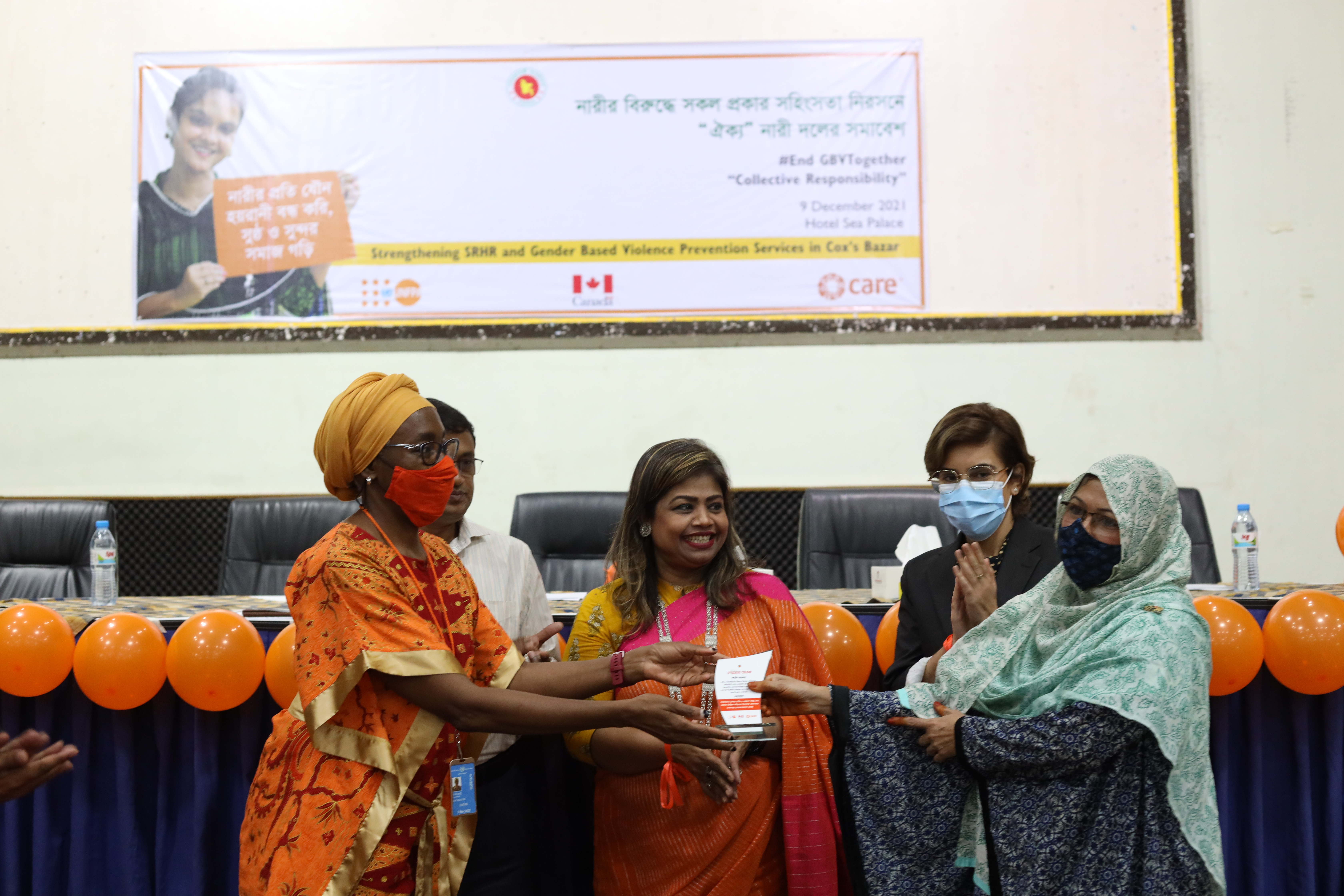
Celebrating the skills of women with a handicraft exhibition
To conclude the 16 Days of Activism activities in Cox’s Bazar for the year 2021, UNFPA and Mukti Cox’s Bazar organized a Women’s Development Fair, which showcased the handicrafts produced by women and girls at the UNFPA-supported Women Led Community Centers and Women Friendly Spaces in the camps. The items displayed included masks, jewelry and clothing, many of which were coupled with stories of bravery and empowerment by the women who had produced them.
Volunteers from both the Rohingya and Host community spoke during the inauguration and described how the skills trainings held by the Women Friendly Spaces and Women-Led Community Centers have enabled the women to become self-reliant and gain more confidence in their abilities.
“It is our collective responsibility to create an enabling environment for women and girls. With the help of the local government and communities, we have achieved a lot in the past year, but we still have a long way to go. If we work hand-in-hand, I know it is possible for us to eliminate all forms of gender based violence from our society,” stated the Chief Executive of Mukti Cox’s Bazar, Bimal Sarker in her remarks at the event.
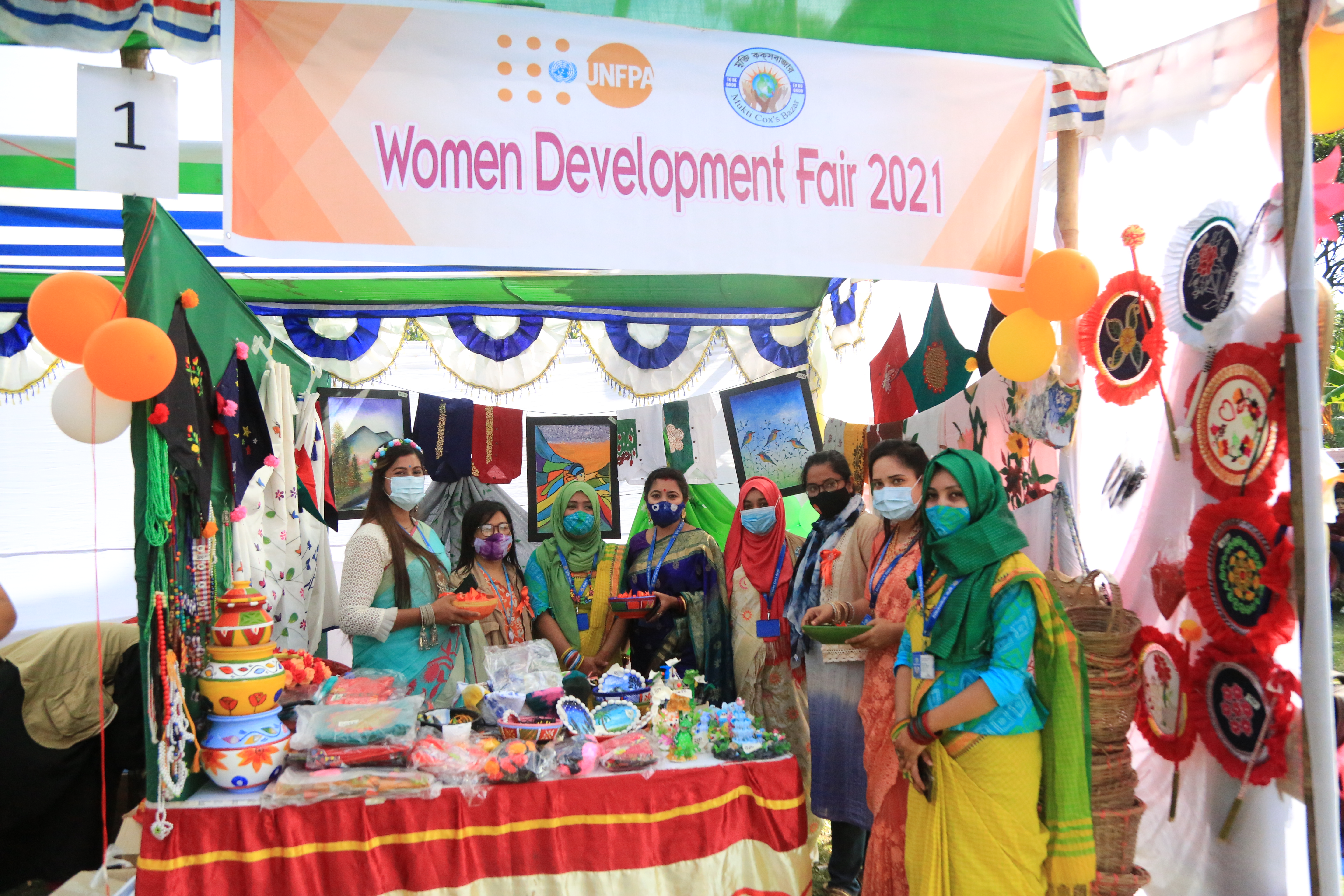
At the final event for 16 Days of Activism in 2021, handicrafts prepared by women in UNFPA-supported Women Friendly Spaces and Women-Led Community Centers were displayed. ©UNFPA Bangladesh
The 16 Days of Activism Against GBV campaign in Cox’s Bazar this year was led by the UNFPA’s Gender-based Violence in Emergencies Unit. By participating in the campaign each year, UNFPA wishes to show how eliminating gender-based violence is critical to achieving a world where every pregnancy is wanted, every childbirth is safe, every young person’s potential is fulfilled.
While the campaign only lasts 16 days, UNFPA’s work to empower women and girls in Bangladesh continues year around. By fighting for the rights of women and girls and combating harmful practices and attitudes, we will continue to strive for a Bangladesh where no-one is left behind and where sexual and reproductive health and rights are enjoyed by all.
